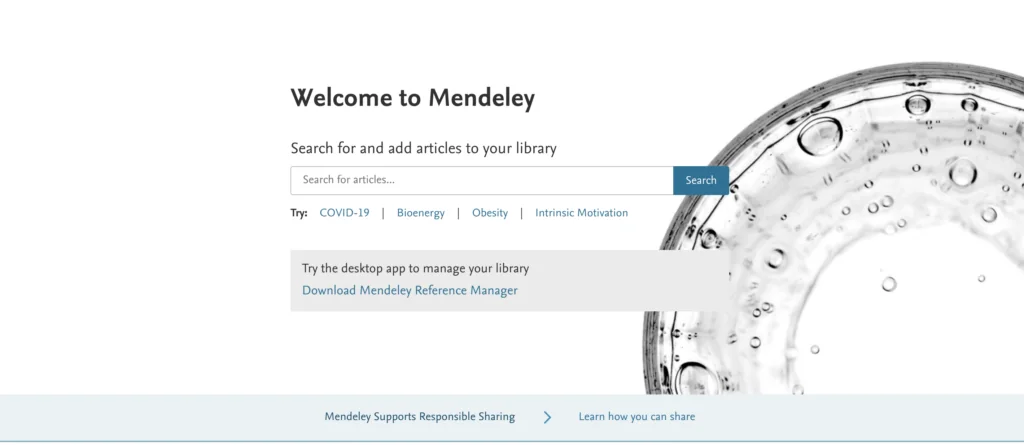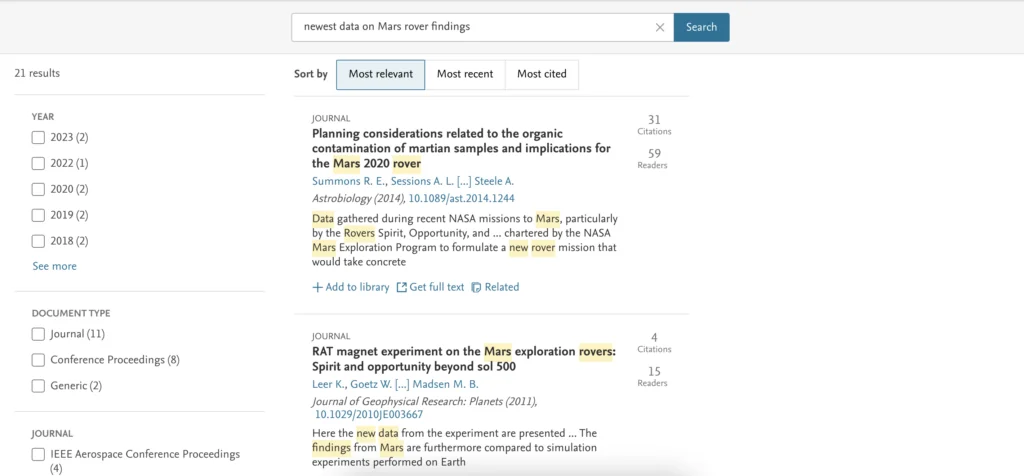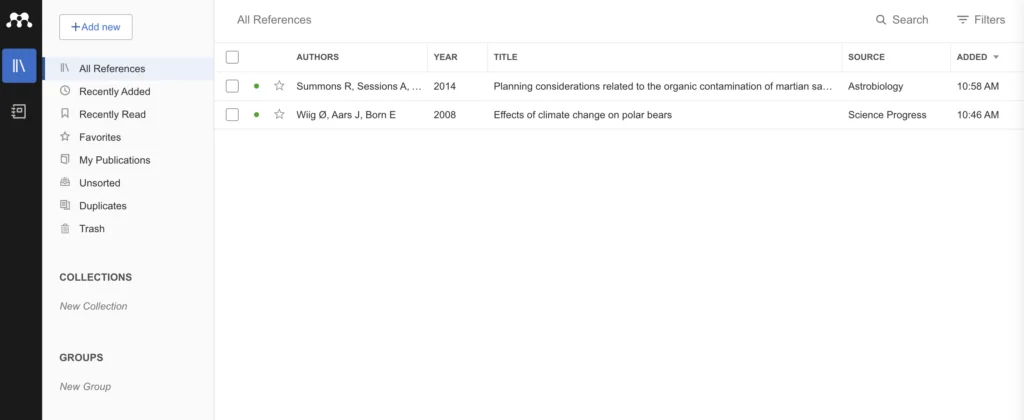Quick Overview
Mendeley and Readcube are robust tools developed to organize reference management and citing research papers. We decided to test these two reference apps and check whose ability to find quality and relevant sources for academic research purposes is better. They provide access to various sources such as journals, books, and conference materials but differ in terms of pricing and specific features. Mendeley stands out with its free access, while Readcube offers a subscription-based model with a 30-day trial period.
| TOP services | Updated March 2024 |
|---|---|

Textero
⭐⭐⭐⭐⭐ |
Get free access |
|
AHELP Reference Finder
⭐⭐⭐⭐⭐ |
Get free access |

Consensus
|
Read review |

Semantic Scholar
|
Read review |

Mendeley
|
Read review |
| MENDELEY | READCUBE | |
| Best fit for | Students and researchers on a budget | Students and professionals needing robust citation management |
| A*Help Score | ⭐⭐⭐⭐⭐ 90/100 | ⭐⭐⭐⭐⭐ 87/100 |
| Search Quality | ⭐⭐⭐⭐ Comprehensive with good filtering options | ⭐⭐⭐⭐⭐ High-quality search with detailed citation formatting |
| Overall Experience | ⭐⭐⭐⭐ User-friendly, simple interface | ⭐⭐⭐⭐⭐ Clear, efficient, business-like interface |
| Value for Money | ⭐⭐⭐⭐⭐ Excellent, as it is free | ⭐⭐⭐⭐⭐ Good, with affordable subscription plans |
Searching Quality: Mendeley vs Readcube
Mendeley scores very high, 44/50 for search quality according to our testing criteria. It offers comprehensive filtering options and access to various sources. We found the ability to search publications by years, journal names, authors, and document types extremely convenient and helpful. What the tool lacks though, is discipline-specific searching. It may take some time for users to find the most suitable papers for their majors. Citation formatting is possible through a plugin, which is a limitation. Also, users can experience issues with accessing some PDF documents, which can be frustrating during research.


Readcube scores higher at 47/50, mainly due to its much more simplified citation formatting. This service also excels in search quality with filters for relevance, citation count, and publication year. It provides a wide range of citation styles directly on the platform, which is, in our opinion, Readcube’s main competitive advantage over Mendeley. Additionally, the browser extension for importing references and accessing full texts enhances its search capabilities, making it a little more convenient tool for academic research in terms of quality compared to Mendeley.
| Sources searched | MENDELEY | READCUBE |
| Climate change effects on Polar bears | ||
| – shows relevant results | ✅ | ✅ |
| – features highly-cited sources | ✅ | ✅ |
| Newest data on Mars rover findings | ||
| – shows relevant results | ✅ | ✅ |
| – features highly-cited sources | ✅ | ✅ |
Comparing Value for Money: Mendeley vs Readcube
Mendeley offers excellent value for money, being entirely free to use. It offers a free reference manager and citation management via an MS Word add-on. This makes it an attractive option for students and researchers on a tight budget. However, its free model comes with some limitations, particularly in citation formatting and accessibility for Mac users since its citation plugin is available for PC.
Readcube operates on a subscription basis with different tiers for students, academics, and corporate users. The student plan is very affordable at $3 annually, and the platform offers a 30-day free trial. It’s a generous plan timewise, allowing users to explore all of the platform’s features before committing. Billing information isn’t required to start the trial, by the way. Despite lacking a free plan, the reasonable pricing and extensive features make Readcube a cost-effective solution for academic research.


Comparing Overall Experience: Mendeley vs Readcube
Mendeley and Readcube score 23/25, which means they both guarantee a very solid user experience, but with different strengths. Mendeley provides a user-friendly environment within the platform with quick registration, a simple interface, and all necessary features like saving papers to a personal library and tagging them. It integrates well with its reference manager and offers mobile and desktop apps for flexibility. What it lacks is some kind of AI assistant. We’re convinced that it would be a very advantageous solution for research.


Readcube offers a clear and efficient user experience with a business-like interface that may not appeal to everyone. Although its simple grayish design may lack some stylistic flare, to be honest, it’s fine, and there is nothing that could distract from work. The service supports saving references to the library, sharing through various platforms, and provides a smooth performance across desktop and mobile applications. A little handy feature of the tool is that it shows a few interesting metrics for the chosen source. These may be the number of citations from this source, other authors who used this paper in their writing, and links to them. Studying and exploring such metrics may become another step in your research process. Like Mendeley, however, Readcube also doesn’t have any AI-powered assistance.
The Verdict
In conclusion, Mendeley and Readcube both offer valuable tools for academic research, each with its strengths and weaknesses. Mendeley’s free model and comprehensive features make it ideal for students and researchers on a budget, while Readcube’s high-quality search and affordable subscription plans cater to those needing robust citation management. Both tools provide reliable support for organizing and accessing research materials, with the choice largely depending on individual needs and preferences.
| Why academichelp.net is a credible source of information: Stay curious with us. Academichelp.net has been a reliable educational resource since 2011, providing students with the latest news, assignment samples, and other valuable materials. Even with the extensive information we process, our quality remains consistent. Each team member has experience in education, allowing us to evaluate new sector offerings critically. Our reviews are up-to-date and relevant, with impartiality ensured by the A*Help score methodology from mystery shopping. We aren’t affiliated with any listed service providers. Our focus remains on providing our audience with reliable and unbiased data. |
Follow us on Reddit for more insights and updates.

Comments (0)
Welcome to A*Help comments!
We’re all about debate and discussion at A*Help.
We value the diverse opinions of users, so you may find points of view that you don’t agree with. And that’s cool. However, there are certain things we’re not OK with: attempts to manipulate our data in any way, for example, or the posting of discriminative, offensive, hateful, or disparaging material.